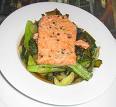FISH
and why you need to eat it!
Oh, you don't eat fish? You don't know what you are missing! Perhaps you didn't learn to eat it as a
child, or you don't like the way it smells, or you've never had it fresh --- whatever the
reason - you need to reexamine your position on fish.
Remember the old wives' tale about fish being BRAIN FOOD? Well, guess what? IT IS!
Eating fish is one of the best things you can do for your brain and your hair. Let's
take a look at the medical evidence, so you don't
think I'm just telling you a "fish story"...
Health Benefits of Eating Fish
Australia’s leading health research body, the National Health and Medical Research Council (NHMRC), suggests that Australians should eat more fish. This is because fish is low in fat, high in protein and an excellent source of omega 3 fatty acids. Researchers worldwide have discovered that eating fish regularly – one or two serves weekly – may reduce the risk of diseases ranging from childhood asthma to prostate cancer. Healthy ways to enjoy fish include baked, poached, grilled and steamed.
Health benefits of eating fish
Regular consumption of fish can reduce the risk of various diseases and disorders. Selected research findings include:
Asthma – children who eat fish may be less likely to develop asthma.
Brain and eyes – fish rich in omega 3 fatty acids can contribute to the health of brain tissue and the retina (the back of the eye).
Cardiovascular disease – eating fish every week reduces the risk of heart disease and stroke by reducing blood clots and inflammation, improving blood vessel elasticity, lowering blood pressure, lowering blood fats and boosting ‘good’ cholesterol.
Dementia – elderly people who eat fish or seafood at least once a week may have a lower risk of developing dementia, including Alzheimer's disease.
Depression – people who regularly eat fish have a lower incidence of depression (depression is linked to low levels of omega 3 fatty acids in the brain).
Diabetes – fish may help people with diabetes manage their blood sugar levels.
Eyesight – breastfed babies of mothers who eat fish have better eyesight, perhaps due to the omega 3 fatty acids transmitted in breast milk.
Inflammatory conditions – regular fish consumption may relieve the symptoms of rheumatoid arthritis, psoriasis and autoimmune disease.
Prematurity – eating fish during pregnancy may help reduce the risk of delivering a premature baby.
Foods rich in omega 3 fatty acids
The recommended daily amount of omega 3 fatty acids from fish is 200–600mg and from plants it is 1–2g.
The following are approximate amounts of omega 3 fatty acids per 60g serve of varieties of fish:
Salmon (fresh Atlantic) 1,200mg
Smoked salmon 1,000mg
Canned salmon 500mg
Sardines 1,500mg
Trout (fresh rainbow) 350mg
Gemfish 300mg
Blue-eye, shark (flake), salmon, squid 250mg
Scallop or calamari 200mg
Sea mullet, abalone 170mg
Canned tuna 145mg
Orange roughy or sea perch 7mg.
The best source of omega 3 fatty acids is fish, rather than fish oil capsules.
Fish oil reduces risk of heart disease
Hundreds of studies have been done on fish or fish oils and their role in the prevention or treatment of heart disease. A review in the British Medical Journal recommends fish or fish oil supplements to prevent heart attacks, particularly in people with vascular disease. How omega-3 fats reduce heart disease is not known, but they are known to lower blood triglycerides and blood pressure, prevent clotting, are anti-inflammatory and reduce abnormal heart rhythms.
A word of caution on mercury
While it is recommended to eat one to two fish meals a week, it is wise to avoid fish high in mercury. Excess mercury appears to affect the nervous system, causing: numb or tingling fingers, lips and toes; developmental delays in walking and talking in children; muscle and joint pain; increased risk of heart attack.
Fish high in mercury include shark, swordfish (broadbill) and marlin, ray, gemfish, ling, orange roughy (sea perch) and southern blue fin tuna. Pregnant women, nursing mothers, women planning pregnancy and children up to six years old should avoid these fish.
If catching and eating your own fish, don’t fish in polluted waters. Bottom feeder species, such as catfish, may ingest more pollutants.
This information is from the Better Health Channel.
They have health
information
fact sheets by category, and
fact sheets from A to Z.
Here are some of their many subjects:
Patient information
Personal stories
Medical dictionary
Medicines guide
Image library
Health news
Healthy eating
Healthy recipes
Food fact sheets
Gardening
and
Health and medical information for consumers, quality assured by the Victorian government (Australia).
These statements have not been evaluated by the Food and Drug Administration. The information
provided is not intended to diagnose, treat, cure or prevent any disease.
Personal note: I feel exceptionally good, eating fish - the kind with fins and scales. I do NOT feel good when I eat shellfish - for what it's worth!
Wise Men STILL Seek Him!
Click on the
photo above
for more good
reasons to incorporate
fish into
your diet.















